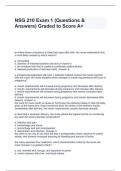Nsg 210 exam 1 - Study guides, Class notes & Summaries
Looking for the best study guides, study notes and summaries about Nsg 210 exam 1? On this page you'll find 65 study documents about Nsg 210 exam 1.
All 65 results
Sort by
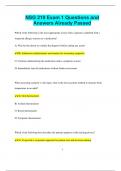
-
NSG 210 Exam 1 Questions and Answers Already Passed
- Exam (elaborations) • 48 pages • 2024
- Available in package deal
-
- $11.99
- + learn more
NSG 210 Exam 1 Questions and Answers Already Passed Which of the following is the most appropriate action when a patient is admitted with a suspected allergic reaction to a medication? A) Wait for the doctor to confirm the diagnosis before taking any action B) Administer antihistamines and monitor for worsening symptoms C) Continue administering the medication unless symptoms worsen D) Immediately stop all medications without further assessment When assessing a patient’s vital si...
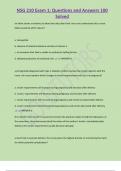
-
NSG 210 Exam 1; Questions and Answers 100 Solved
- Exam (elaborations) • 36 pages • 2024
- Available in package deal
-
- $16.99
- + learn more
NSG 210 Exam 1; Questions and Answers 100 Solved an infant shows a tendency to bleed two days after birth. the nurse understands this is most likely caused by which reason? a. hemophilia b. absence of intestinal bacteria and lack of vitamin k c. an immature liver that is unable to synthesize clotting factors d. delayed production of red blood cells ANSWER-b
NSG 210 Exam 1 (Questions & Answers) Graded to Score A+
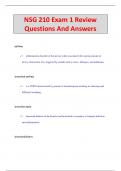
-
NSG 210 Exam 1 Review Questions And Answers
- Exam (elaborations) • 106 pages • 2024
-
- $12.49
- + learn more
Excretion is different for children. 2 considerations are... ~ ...infants under 9 months have decreased renal flow, meds are excreted more slowly, resulting in toxicity potential. What is the cause of decreased renal function in infants under 9 months? ~ lower renal blood flow, decreased glomerular filtration rate, lower renal tubular function. Two basic measurement systems for calculating pediatric doses: ~ :1. weight in kg. 2. body surface area What is the most important facet ...
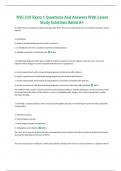
-
NSG 210 Exam 1 Questions And Answers With Latest Study Solutions Rated A+
- Exam (elaborations) • 22 pages • 2024
- Available in package deal
-
- $12.99
- + learn more
NSG 210 Exam 1 Questions And Answers With Latest Study Solutions Rated A+ an infant shows a tendency to bleed two days after birth. the nurse understands this is most likely caused by which reason? a. hemophilia b. absence of intestinal bacteria and lack of vitamin k c. an immature liver that is unable to synthesize clotting factors d. delayed production of red blood cells ANS b a primigravida diagnosed with type 1 diabetes mellitus reviews the insulin regimen with the nurse. the nurs...
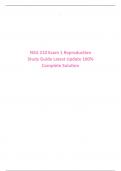
-
NSG 210 Exam 1 Reproduction Study Guide Latest Update 100% Complete Solution
- Exam (elaborations) • 29 pages • 2023
- Available in package deal
-
- $18.49
- + learn more
NSG 210 Exam 1 Reproduction Study Guide Latest Update 100% Complete Solution
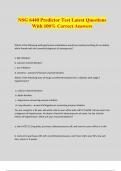
-
NSG 6440 Predictor Test Latest Questions With 100% Correct Answers
- Exam (elaborations) • 49 pages • 2024
-
- $14.49
- + learn more
NSG 6440 Predictor Test Latest Questions With 100% Correct Answers Which of the following antihypertensive medications would you avoid prescribing for an elderly white female with the comorbid diagnosis of osteoporosis? a. Beta blockers b. Calcium channel blockers c. Ace inhibitors d. Diuretics - answerCalcium channel blockers Which of the following class of drugs is preferred treatment for a diabetic with stage II hypertension? a. Calcium channel blockers b. Alpha blockers c. Angiot...
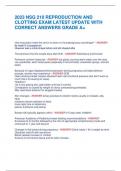
-
2023 NSG 210 REPRODUCTION AND CLOTTING EXAM LATEST UPDATE WITH CORRECT ANSWERS GRADE A+
- Exam (elaborations) • 39 pages • 2023
- Available in package deal
-
- $12.99
- + learn more
2023 NSG 210 REPRODUCTION AND CLOTTING EXAM LATEST UPDATE WITH CORRECT ANSWERS GRADE A+ How long does it take the cervix to return to it's prepregnancy size/shape? - ANSWERBy week 6 of postpartum However was a circle shape before and slit shaped after The perineum the first couple days after birth - ANSWER-Edematous and bruised Perineum comfort measures - ANSWER-Ice packs, pouring warm water over the area via a peribottle, witch hazel pads (especially if hemorrhoids), anesthetic sprays, ...
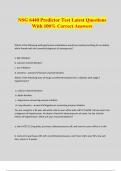
-
NSG 6440 Predictor Test Latest Questions With 100% Correct Answers
- Exam (elaborations) • 49 pages • 2024
- Available in package deal
-
- $14.49
- + learn more
NSG 6440 Predictor Test Latest Questions With 100% Correct Answers Which of the following antihypertensive medications would you avoid prescribing for an elderly white female with the comorbid diagnosis of osteoporosis? a. Beta blockers b. Calcium channel blockers c. Ace inhibitors d. Diuretics - answerCalcium channel blockers Which of the following class of drugs is preferred treatment for a diabetic with stage II hypertension? a. Calcium channel blockers b. Alpha blockers c. Angiot...
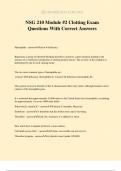
-
NSG 210 Module #2 Clotting Exam Questions With Correct Answers
- Exam (elaborations) • 32 pages • 2024
- Available in package deal
-
- $12.49
- + learn more
NSG 210 Module #2 Clotting Exam Questions With Correct Answers Hemophilia - answerFactor 8 deficiency Represents a group of inherited bleeding disorders caused by a gene mutation leading to the absence of or ineffective production of clotting protein factors. The severity of the condition is determined by the level of clotting factor. The two most common types of hemophilia are: 1) factor VIII deficiency (hemophilia A) 2) factor IX deficiency (hemophilia B) This genetic recessive disorde...

Did you know that on average a seller on Stuvia earns $82 per month selling study resources? Hmm, hint, hint. Discover all about earning on Stuvia

